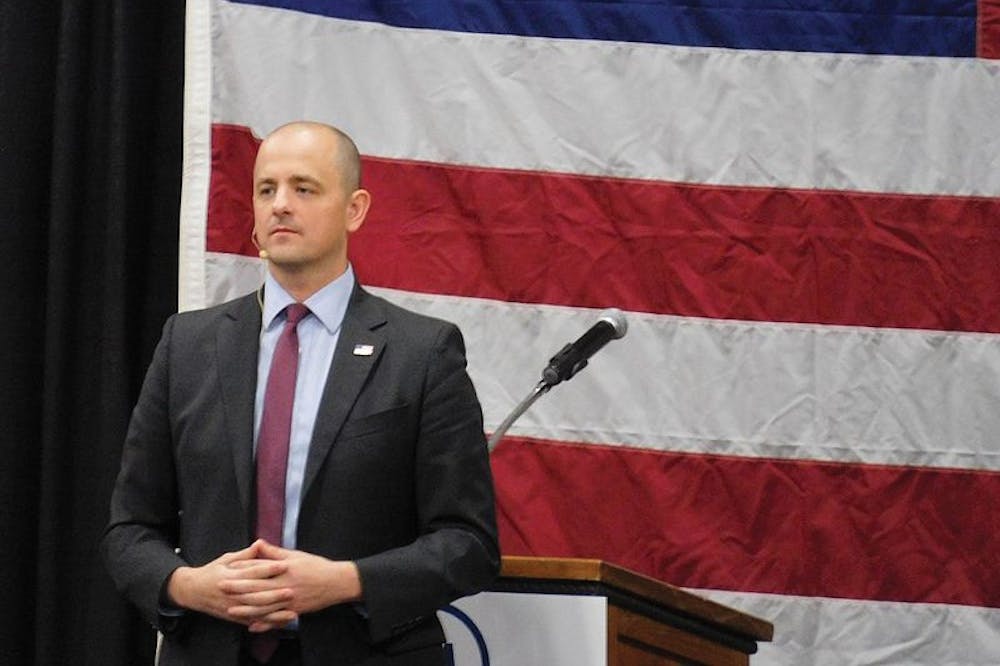This election has seen many firsts, such as the nomination of a woman to lead a major party presidential ticket, the Harvard Republican Club’s refusal to endorse their party’s nominee and the refusal of a presidential candidate to release tax returns. Yet it still seems that the greatest first may be the unlikely success of independent candidate 2011 Wharton graduate Evan McMullin.
McMullin has led recent polls in his home state of Utah, including one released by Emerson College on Oct. 19. If he were to win the state, it would be the first time Utah has elected a non-Republican presidential candidate since 1964, when its four electoral votes went in support of President Lyndon B. Johnson.
Now, Utah has the opportunity to be pivotal in an election in which no one had pegged it for a swing state. If McMullin snags Utah, he willbecome the first independent to win electoral votes in a general election since 1968, when Alabama Gov. George Wallace took Alabama, Georgia, Mississippi and Louisiana.
Unlike the other two prominent candidates, McMullin’s historyis not public knowledge. The 40-year-old independent candidate is a Mormon from Provo, Utah. He attended Brigham Young University and earned a Master’s degree in Business Administration from Wharton in 2011.
According to his website, McMullin worked in the CIA for about a decade and spent some time in investment banking. He later joined the House Committee on Foreign Affairs as a senior advisor and eventually became the Chief Policy Director of the House Republican Conference.
“In a year where Americans have lost faith in the candidates of both major parties, it’s time for a generation of new leadership to step up,” McMullin said to ABC News after announcing his bid for the presidency.
In the Utah primary caucuses in March, Donald Trump garnered only 14 percent of the vote and landed in third place.
While it is nearly impossible for a third-party candidate to win the election directly, it is not entirely impossible for them to change the course of the election and deadlock the Electoral College. Though Utah’s current six electoral votes may not seem like enough to tie up the 538 electors, experts say it may be possible.
A candidate needs 270 electoral votes to claim victory. Taking six electoral votes out of the race could leave either candidate hanging without a majority, in which case the election would be sent to Congress under the Twelfth Amendment.
For Trump, this would only serve to narrow his already extremely tight path to the presidency. Though McMullin qualified to have his name on the ballot in only 11 states, winning even one of these states could upset the traditional electoral math.
Unlike former New Mexico Gov. Gary Johnson, the Libertarian candidate who is drawing relatively equal levels of support away from Clinton and Trump, McMullin is largely drawing his support from Republicans who cannot stomach a Trump presidency.
Trump has not been popular with Mormons, and a strong disavowal from 2012 Republican nominee Mitt Romney, who won Utah by about 50 points, has not helped him either.
In June 2016, two months before McMullin entered the race, The New York Times ran an op-ed entitled “Donald Trump’s Mormon Problem.” The article detailed how Trump’s qualities and values clash with Mormons’, who place a high value on chastity and hold “merciful views” on immigration.
The Emerson College poll showed McMullin is polling strongest among younger voters. He has 36 percent of voters under 35 years old compared to Trump and Clinton’s equal 22 percent.
The Emerson study also showed a decline in Republican support for Trump in Utah. Sen. Ted Cruz (R-Texas) won the Utah caucus with an impressive 69 percent of the vote. Of those Cruz supporters, 51 percent are backing McMullin and only 29 percent plan to vote for Trump.
The same discontent that fueled Trump’s rise may now be creating blowback for him in a state that was never thought to be up in the air for Republicans.









